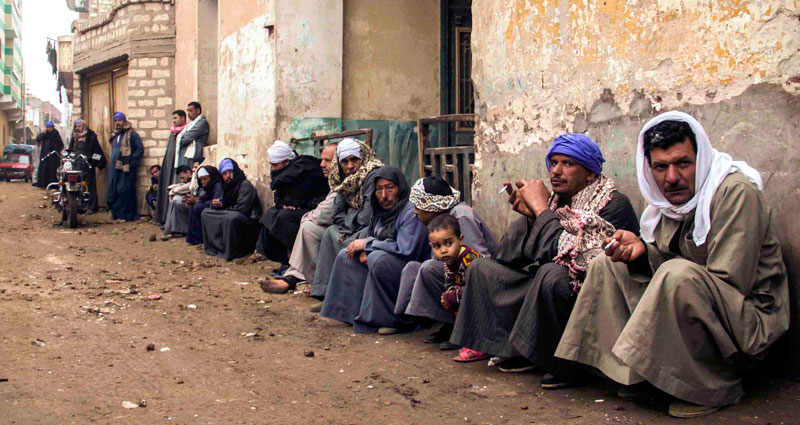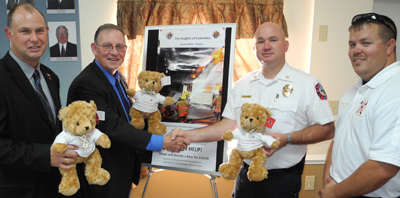
WASHINGTON—If Christians and other religious minorities disappear in Iraq and Syria, “pluralism and stability leave with them,” the head of the Knights of Columbus told a congressional commission April 19.
Supreme Knight Carl Anderson said the United States must help stop the genocide of Christians and others now taking place in the Middle East. The nation also must act to prevent its recurrence and to ensure the future of the affected communities, he said.
In testimony before Congress’ Tom Lantos Human Rights Commission, Anderson said the situation “also implicates the national security of the United States.”
On March 17, U.S. Secretary of State John Kerry said that atrocities carried out by Islamic State militants against Yezidis, Christians and other minorities were genocide, the first U.S. declaration of genocide since Sudanese actions in Darfur in 2004.
Kerry said he was not judge and jury, but Islamic State had self-defined itself as genocidal because of its actions against Yezidis, Christians, Shiite Muslims and other minorities.
A 66-member coalition is “working intensively to stop the spread of Daesh,” Kerry said, using the Arabic acronym for Islamic State. He said the world must “marginalize and defeat violent extremists, once and for all,” so they were not replaced by another extremist group with a different acronym.
The Knights of Columbus and In Defense of Christians spearheaded an effort by a number of faith-based and other groups urging Kerry to issue the declaration.
“We must recognize and hold the perpetrators accountable,” Kerry said in his statement that included a litany of atrocities such as rape and murder. He said Christians often were given the choice of converting to Islam or death, which was a choice between two types of death.
A week prior to Kerry’s announcement, Knights and In Defense of Christians issued a 278-page report at a Washington news conference. It contained dozens of statements collected from Feb. 22 through March 3 from witnesses and victims of atrocities carried out by Islamic State forces. The incidents included torture, rapes, kidnappings, murder, forced conversions, bombings and the destruction of religious property and monuments.
In his testimony, Anderson told members of Congress they should follow up on the genocide declaration with actions in several key areas.
As lands are liberated, he said, proper planning must be in place to assist those evicted by Islamic State and those who flee military actions that liberate lands under the militant group’s control. Genocide victims who wish to return to their home areas should be helped to do so, he noted.
Those genocide survivors who wish to come to the United States must not be put at the back of the line, Anderson said. Of the 1,366 Syrian refugees admitted to the U.S. in 2016, fewer than 3 percent came from the groups targeted for genocide, he added.
“It is wrong to exclude those who faced genocide, often on the basis of bureaucratic oversight,” said Anderson, adding that the U.S. also must help victims who wish to remain in Iraq and Syria.
“The United States cannot help defeat ISIS without defeating its genocidal antecedents. The malignant idea that discrimination and second-class status are the lot of religious minorities, and that those who offend Islam, whether Muslim or non-Muslim, must be eliminated,” he said.
If Christians and other religious minorities “disappear,” he continued, “pluralism and stability leave with them. Iraq and Syria will at best become unstable majoritarian tyrannies.”
Critical to achieving “real pluralism in the region,” according to Anderson, is for the people there to look to the example of America’s legal concepts of equal protection, free speech, freedom of the press and assembly, and the free exercise of religion were critical. He pointed out that such principles are also part of the U.N. Universal Declaration of Human Rights.
“Finally, we must help create the interpersonal relationships that bind society together,” said Anderson.
He pointed to Northern Ireland and South Africa as places where deep divisions gave way to peaceful reconciliation. Christians in the Middle East, he said, have already expressed a spirit of forgiveness that could form the basis for a commission of reconciliation and mercy.
“Peace, equality and stability, rather than religious terrorism and genocide, can be the legacy of these countries and of our involvement there,” said Anderson. “Our leadership can help these societies, the Middle East and the security of the American people.”
The Knights of Columbus, based in New Haven, Conn., recently began airing a new television ad nationwide to highlight the ongoing needs faced by Christian victims of genocide in the Middle East.
According to the ad, persecution and displacement have not abated since Kerry’s declaration of genocide and the victims “remain in dire need of assistance.”
On April 20, Britain’s House of Commons also voted to declare Islamic State atrocities as “genocide,” an action welcomed by the Catholic bishops of the country.
Catholic News Service
CNS photo/Alaa Elkamhawia, EPA: People gather in Minya, Egypt, on Feb. 16 for the funeral of Coptic Christians kidnapped and killed by Islamic State rebels in Libya. U.S. Secretary of State John Kerry said atrocities carried out by the Islamic State group against Yezidis, Christians and other minorities were genocide, the first U.S. declaration of genocide since Sudanese actions in Darfur in 2004.



